人教版高中英语必修四unit4Reading
- 格式:ppt
- 大小:3.60 MB
- 文档页数:68

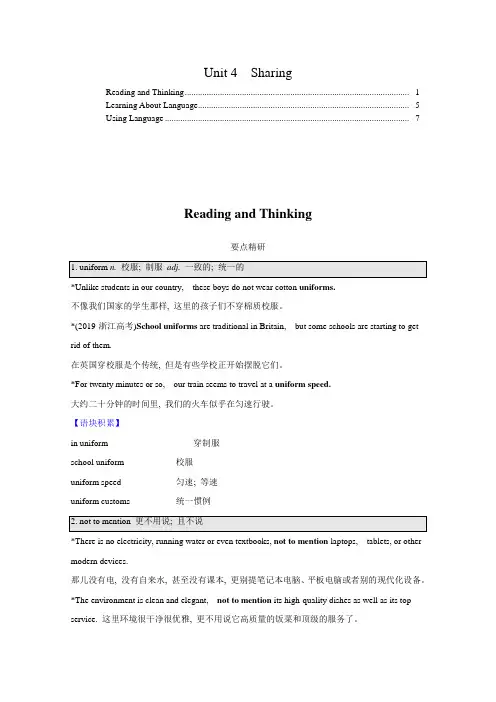
Unit 4SharingReading and Thinking ...................................................................................................... - 1 -Learning About Language ................................................................................................ - 5 -Using Language ............................................................................................................... - 7 -Reading and Thinking要点精研*Unlike students in our country, these boys do not wear cotton uniforms.不像我们国家的学生那样, 这里的孩子们不穿棉质校服。
*(2019·浙江高考)School uniforms are traditional in Britain, but some schools are starting to get rid of them.在英国穿校服是个传统, 但是有些学校正开始摆脱它们。
*For twenty minutes or so, our train seems to travel at a uniform speed.大约二十分钟的时间里, 我们的火车似乎在匀速行驶。
【语块积累】in uniform 穿制服school uniform 校服uniform speed 匀速; 等速uniform customs 统一惯例*There is no electricity, running water or even textbooks, not to mention laptops, tablets, or other modern devices.那儿没有电, 没有自来水, 甚至没有课本, 更别提笔记本电脑、平板电脑或者别的现代化设备。
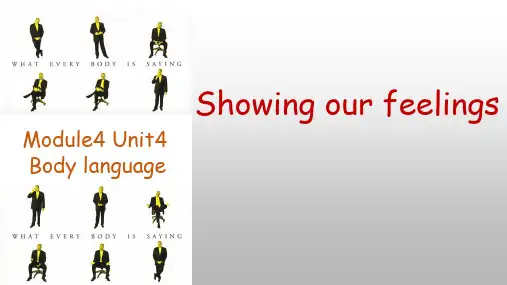
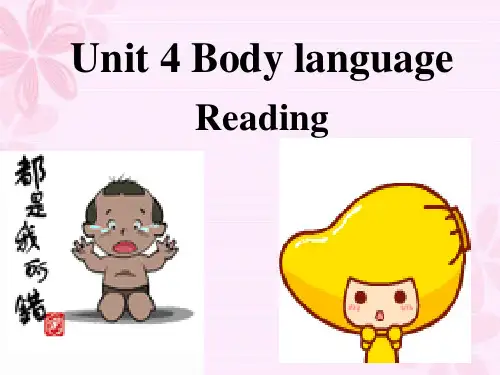
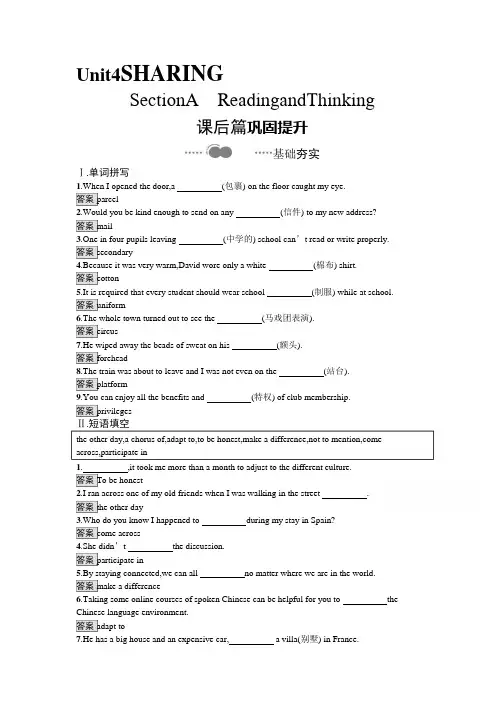
Unit4SHARINGSectionA ReadingandThinking课后篇巩固提升基础夯实Ⅰ.单词拼写1.When I opened the door,a (包裹) on the floor caught my eye.答案 parcel2.Would you be kind enough to send on any (信件) to my new address?答案 mail3.One in four pupils leaving (中学的) school can’t read or write properly. 答案 secondary4.Because it was very warm,David wore only a white (棉布) shirt.答案 cotton5.It is required that every student should wear school (制服) while at school. 答案 uniform6.The whole town turned out to see the (马戏团表演).答案 circus7.He wiped away the beads of sweat on his (额头).答案 forehead8.The train was about to leave and I was not even on the (站台).答案 platform9.You can enjoy all the benefits and (特权) of club membership.答案 privilegesⅡ.短语填空the other day,a chorus of,adapt to,to be honest,make a difference,not to mention,come across,participate in1.,it took me more than a month to adjust to the different culture.答案 To be honest2.I ran across one of my old friends when I was walking in the street .答案 the other day3.Who do you know I happened to during my stay in Spain?答案 come across4.She didn’t the discussion.答案 participate in5.By staying connected,we can all no matter where we are in the world.答案 make a difference6.Taking some online courses of spoken Chinese can be helpful for you to the Chinese language environment.答案 adapt to7.He has a big house and an expensive car, a villa(别墅) in France.答案 not to mention8.To his surprise,his proposal was greeted with laughter.答案 a chorus ofⅢ.完成句子1.他们花了大约三个小时才爬到泰山顶上。
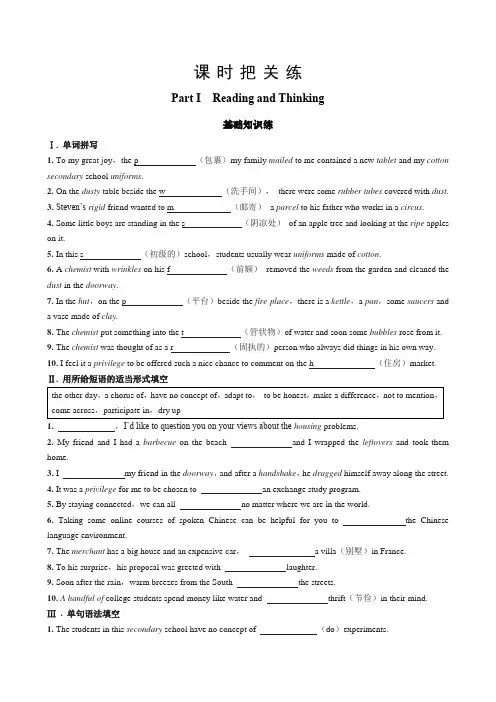
课时把关练Part I Reading and Thinking基础知识练Ⅰ. 单词拼写1. To my great joy,the p (包裹)my family mailed to me contained a new tablet and my cotton secondary school uniforms.2. On the dusty table beside the w (洗手间),there were some rubber tubes covered with dust.3. Steven’s rigid friend wanted to m (邮寄)a parcel to his father who works in a circus.4. Some little boys are standing in the s (阴凉处)of an apple tree and looking at the ripe apples on it.5. In this s (初级的)school,students usually wear uniforms made of cotton.6. A chemist with wrinkles on his f (前额)removed the weeds from the garden and cleaned the dust in the doorway.7. In the hut,on the p (平台)beside the fire-place,there is a kettle,a pan,some saucers anda vase made of clay.8. The chemist put something into the t (管状物)of water and soon some bubbles rose from it.9. The chemist was thought of as a r (固执的)person who always did things in his own way.10. I feel it a privilege to be offered such a nice chance to comment on the h (住房)market. Ⅱ. 用所给短语的适当形式填空1. ,I’d like to question you on your views about the housing problems.2. My friend and I had a barbecue on the beach and I wrapped the leftovers and took them home.3. I my friend in the doorway,and after a handshake,he dragged himself away along the street.4. It was a privilege for me to be chosen to an exchange study program.5. By staying connected,we can all no matter where we are in the world.6. Taking some online courses of spoken Chinese can be helpful for you to the Chinese language environment.7. The merchant has a big house and an expensive car, a villa(别墅)in France.8. To his surprise,his proposal was greeted with laughter.9. Soon after the rain,warm breezes from the South the streets.10. A handful of college students spend money like water and thrift(节俭)in their mind.Ⅲ. 单句语法填空1. The students in this secondary school have no concept of (do)experiments.2. She decided to major in chemistry in college because she wanted to be a (chemistry)by profession.3. Being a teacher,it is a privilege (help)students to obtain knowledge and better themselves.4. Beside the hut,colorful and exotic flowers (shade)by towering rare trees.5. This truck was heading on a (dust)dirt road,disappearing into a small valley.6. The (house)problems came up at the meeting once again yesterday.7. My friends and I have been dying (have)a barbecue for a long time.8. There’s no electricity running water and not even textbooks.Ⅳ. 练通句型【一句多译】1. 爬山者用了大约三个小时才爬到泰山顶上。
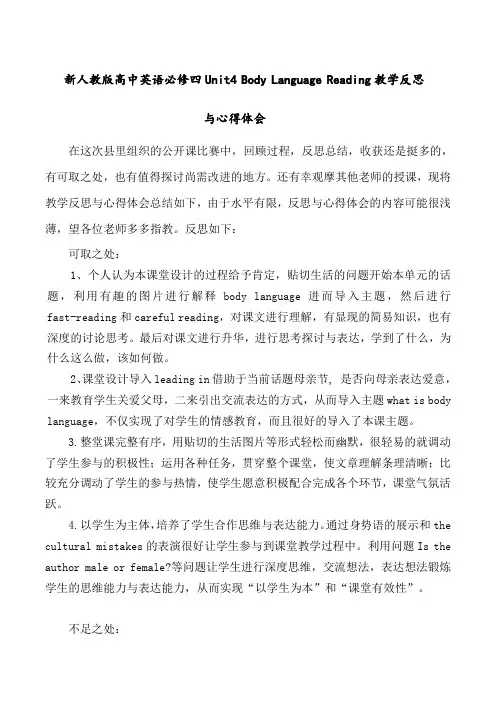
新人教版高中英语必修四Unit4 Body Language Reading教学反思与心得体会在这次县里组织的公开课比赛中,回顾过程,反思总结,收获还是挺多的,有可取之处,也有值得探讨尚需改进的地方。
还有幸观摩其他老师的授课,现将教学反思与心得体会总结如下,由于水平有限,反思与心得体会的内容可能很浅薄,望各位老师多多指教。
反思如下:可取之处:1、个人认为本课堂设计的过程给予肯定,贴切生活的问题开始本单元的话题,利用有趣的图片进行解释body language 进而导入主题,然后进行fast-reading和careful reading,对课文进行理解,有显现的简易知识,也有深度的讨论思考。
最后对课文进行升华,进行思考探讨与表达,学到了什么,为什么这么做,该如何做。
2、课堂设计导入leading in借助于当前话题母亲节, 是否向母亲表达爱意,一来教育学生关爱父母,二来引出交流表达的方式,从而导入主题what is body language,不仅实现了对学生的情感教育,而且很好的导入了本课主题。
3.整堂课完整有序,用贴切的生活图片等形式轻松而幽默,很轻易的就调动了学生参与的积极性;运用各种任务,贯穿整个课堂,使文章理解条理清晰;比较充分调动了学生的参与热情,使学生愿意积极配合完成各个环节,课堂气氛活跃。
4.以学生为主体,培养了学生合作思维与表达能力。
通过身势语的展示和the cultural mistakes的表演很好让学生参与到课堂教学过程中。
利用问题Is the author male or female?等问题让学生进行深度思维,交流想法,表达想法锻炼学生的思维能力与表达能力,从而实现“以学生为本”和“课堂有效性”。
不足之处:1. 学生思考的广度不够,阅读中停留在reading for information较多,而缺少reading for thinking,教学过程中基本上基于信息找寻的问题居多,而进行深入思考的的问题过少而且范围狭窄。
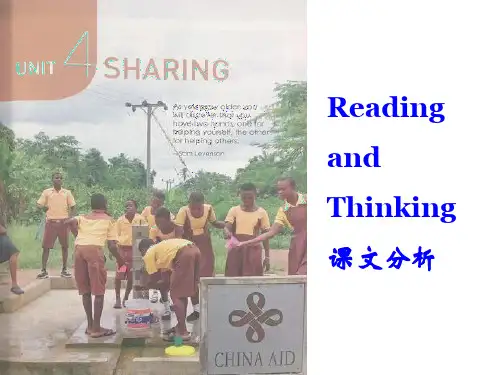
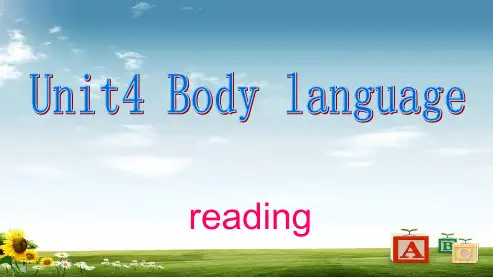
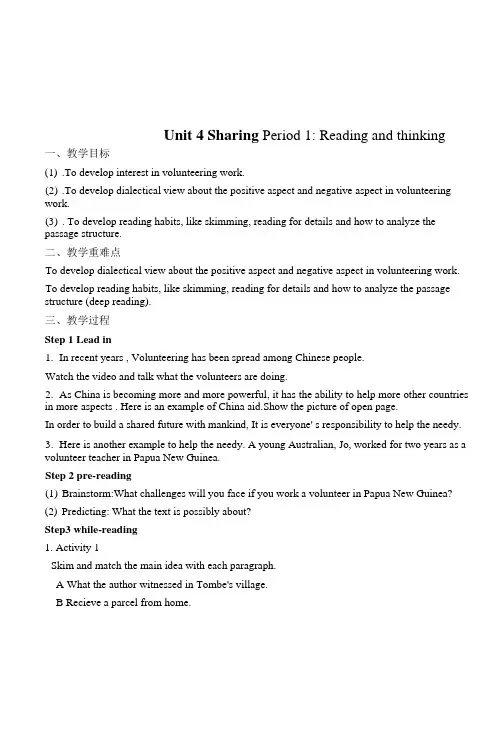
Unit 4 Sharing Period 1: Reading and thinking 一、教学目标(1).To develop interest in volunteering work.(2).To develop dialectical view about the positive aspect and negative aspect in volunteering work.(3). To develop reading habits, like skimming, reading for details and how to analyze the passage structure.二、教学重难点To develop dialectical view about the positive aspect and negative aspect in volunteering work. To develop reading habits, like skimming, reading for details and how to analyze the passage structure (deep reading).三、教学过程Step 1 Lead in1.In recent years , Volunteering has been spread among Chinese people.Watch the video and talk what the volunteers are doing.2.As China is becoming more and more powerful, it has the ability to help more other countries in more aspects . Here is an example of China aid.Show the picture of open page.In order to build a shared future with mankind, It is everyone' s responsibility to help the needy.3.Here is another example to help the needy. A young Australian, Jo, worked for two years as a volunteer teacher in Papua New Guinea.Step 2 pre-reading(1)Brainstorm:What challenges will you face if you work a volunteer in Papua New Guinea?(2)Predicting: What the text is possibly about?Step3 while-reading1. Activity 1Skim and match the main idea with each paragraph.A What the author witnessed in Tombe's village.B Recieve a parcel from home.Would you like to become a volunteer teacher? Why or why not?四、教后反思(不少于100字)。
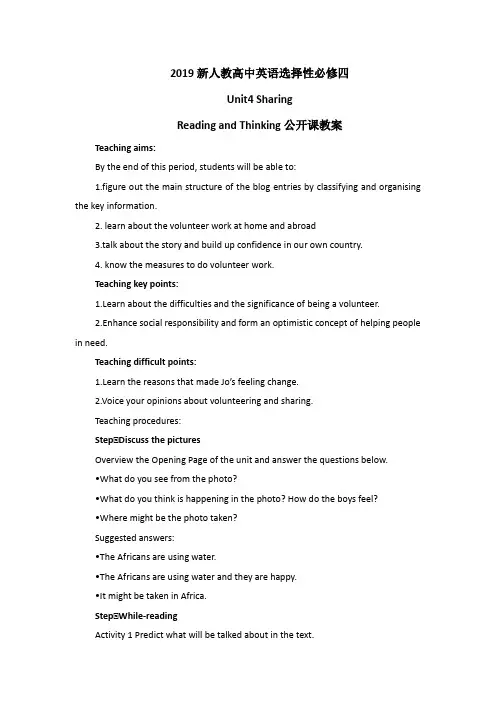
2019新人教高中英语选择性必修四Unit4 SharingReading and Thinking公开课教案Teaching aims:By the end of this period, students will be able to:1.figure out the main structure of the blog entries by classifying and organising the key information.2. learn about the volunteer work at home and abroad3.talk about the story and build up confidence in our own country.4. know the measures to do volunteer work.Teaching key points:1.Learn about the difficulties and the significance of being a volunteer.2.Enhance social responsibility and form an optimistic concept of helping people in need.Teaching difficult points:1.Learn the reasons that made Jo’s feeling change.2.Voice your opinions about volunteering and sharing.Teaching procedures:StepⅠDiscuss the picturesOverview the Opening Page of the unit and answer the questions below.•What do you see from the photo?•What do you think is happening in the photo? How do the boys feel?•Where might be the photo taken?Suggested answers:•The Africans are using water.•The Africans are using water and they are happy.•It might be taken in Africa.StepⅠWhile-readingActivity 1 Predict what will be talked about in the text.Before your reading, list details in the first two columns. Fill in the last column after reading.Suggested answers:Look at the title “Help the needy” and the two pictures on Pages 38-39,answer the following questions.1.What does the “needy” mean?2.Who are the needy? What do they need?3.Why should we help them? 4.What can you see in the pictures? Activity 2 Reading for the structure.Read the blog entries and choose the main idea of each part.Suggested answers:Paragraph 1: AParagraphs 2-3: DParagraphs 4-7: BParagraph 8: CActivity3Reading for details.Read Paragraph 1 of the blog entries and answer the question.What can we infer from the sentence “I’ve been dying to have some of my favourite sweets, and it’s always nice to get mail!”?Suggested answer:She can’t buy her favourite sweets there and the communication conditions are poor.Activity4Reading for details.Read Paragraphs 2-3 of the blog entries and complete the table.Activity5Reading for details.Read Paragraphs 4-7.Write T(true) or F(false) and correct the false statement(s).1.Jo and another teacher took the bus to get Tombe’s village.2.There was a comfortable bed for Jenny and Jo to sleep on.3.The possessions in the hut were one broom, a few saucers, a kettle, cups, pans, and a couple of jars.4.Tombe’s family were talking in English during the meal.Suggested answers:1.F Jo and another teacher walked for two and a half hours to get Tombe’s village.2.F There was a platform for Jenny and Jo to sleep on.3.T4.F Tombe’s family were talking in their language during the meal.Activity6Reading for feelings and attitudes.StepⅠPost-readingpare our school with the one described in the text, and then fill in the table below.2.Ask students to discuss these questions in groups.(1)Jo felt it was a privilege to have spent a day with Tombe’s family. If you were Jo, how do you think you would have felt?(2)Why do you feel it?(3)Would you like to become a volunteer teacher? Why or why not?StepⅠ HomeworkFinish what you have learnt in the last column of KWL chart.Suggested answer:I have learnt many useful words and expressions to describe the volunteer job and I will find out more measures to do volunteer work.。
Unit 4 Body language •What do you think the purpose of language?•How can you communicate with someone if you cannot speak?•How many ways can you think of to greet someone if you cannot speak?Communication: No problem?•Step1. fast reading•1) What is the main idea of the text?2) How many parts can we divide the passageinto?3) What’s the main idea for each part?•1) What is the main idea of the text?–The passage introduces some examples of cultural body language when greetingpeople.•2) How many parts can we divide the •passage into?–Part 1 (para. 1)–Part 2 (para. 2 and 3 )–Part 3 (para. 4 and 5 )3) What’s the main idea for each part?Part 1 (para. 1)We are sent to Capital International Airport to meet some international students.Part 2 (para. 2 and 3)Examples of learned or cultural “bodylanguage”.Part 3 (para. 4 and 5)Different people have different physical ways to greet others. Learning about their customs can help avoid difficulties in communication.Step 2. Scan the text and find outCountry / Area Ways to greet each otherBritain Shake hands. Do not stand very close to others or touchstrangers when they meet.Canada Shake hands.Japan Bow.Spain, Italy, SouthAmerican countriesApproach others closely and are more likely to touch them. France Shake hands and kiss each other twice on each cheek.Middle East, some Muslim countries Shake hands and stand quite close to other men. Nod to women but do not shake hands with them.Name Description Body language To whom Tony Garcia man from Colombia Kiss on the cheek everyoneJulia Smith woman from Britain no touching everyoneAkira Nagata man from Japan bowing everyone George Cook man from Canada shaking hands everyoneAhmed Aziz man from Jordan shaking handsnodding to manto womanDarlene Coulon woman from France shake hands and kisstwice on each cheekpeople she knowsStep 3. use the passage to help you answer the following questions1) Is the author of this passage male or female? How doyou know?The author is male. Ahmed Aziz will not shake hands with women, but he shakes hands with the author.2) What were the two mistakes that the author noticed?He noticed that the Colombian man kissed theBritish woman, but in her culture, a kiss from astranger is not expected. He also noticed that theJapanese man bowed just as the Canadian manstarted to shake hands, so one man’s nosetouched the other man’s hand.•3)Who seemed to prefer to keep more physical diastance from others? Who seemed to prefer closer physical distance ?•The British woman, Julia and probably the Canadian man, George, seemed to prefer to keep more physicaldistance from others. The Colombian man, Tony, and the Jordanian man Ahmed, seemed to prefer closer physical distance.•4) Did any students have similar greeting customs? If so, which one?•Yes. Tony from Colombia and Darlene from France had a similar greeting custom —a kiss. George from Canada and Ahmed from Jordan also had a similar greeting custom —a handshake, but Ahmed shakes hands only with men.•5) “When in Rome, do as the Romans do.”What do you think this famous saying means?•This saying means that when we are in a certain place, we should follow the customs of the people who live in that place, not our own customs.•6) Do you agree with the author’s statement that body language is not good or bad? Why or why not?Step 4. summaryStep 5. translation1.The first person to arrive was TonyGarcia, closely followed by Julia Smith from Britain.2. Not all cultures greet each other thesame way, nor are they comfortable in the same way with touching or distance between people.3. However, people from places like Spain,Italy or South American countriesapproach others closely and are morelikely to touch them.Step 5. homework •Complete p.27 Exercise 3。
人教版高中英语必修四Unit 4课文翻译Unit 4 Body language―Reading―COMMUNICATION: NO PROBLEM?交际:没有问题了吗?Yesterday, another student and I, representing our university's student association, went to the Capital International Airport to meet this year's international students. 昨天,我和另一个学生代表我们学校的学生会,到首都国际机场迎接今年的留学生。
They were coming to study at Beijing University. We would take them first to their dormitories and then to the student canteen. 他们来北京大学学习。
我们会首先把他们带到宿舍,然后去学生食堂。
After half an hour of waiting for their flight to arrive, I saw several young people enter the waiting area looking around curiously. 在等了半个小时之后,我看见几个年轻人走进了等候区,好奇地向四周张望。
I stood for a minute watching them and then went to greet them. 站着观察了他们一分钟后,我便走过去跟他们打招呼。
The first person to arrive was Tony Garcia from Colombia, closely followed by Julia Smith from Britain. 第一个到达的是从哥伦比亚来的托尼?加西亚,随后紧跟着的是英国的朱莉娅?史密斯。